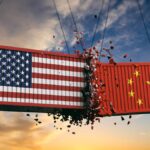(Bloomberg) — The Metropolitan Transportation Authority approved a revised congestion pricing plan for Manhattan that President-elect Donald Trump has threatened to terminate once he takes office.
The board of the MTA, which runs the city’s transit system and is implementing the new toll, voted 12 to 1 Monday to begin the program, which officials anticipate will provide $15 billion to modernize a more than 100-year-old system.
“Transit has to be preserved and expanded and improved or New York ain’t gonna be New York,” Janno Lieber, the MTA’s chief executive officer, said during the board meeting. “New York couldn’t exist without it.”
The program will charge E-ZPass motorists entering south of Manhattan’s 60th Street $9 during peak hours, which is from 5 a.m. to 9 p.m. on weekdays, with E-ZPass trucks paying $14.40 during those hours. Vehicles without an E-ZPass would pay more.
Drivers already paying tolls on the Lincoln, Holland, Queens-Midtown or Brooklyn-Battery tunnels will receive discounts during peak times to help lower the new fee. Fares will also be significantly cheaper when driving overnight with E-ZPass passenger cars paying $2.25 and trucks paying $3.60. Under the new plan, taxi passengers would pay $0.75 per trip, while customers riding in a for-hire vehicle such as Uber and Lyft would pay $1.50.
The vote comes after Governor Kathy Hochul abruptly halted the plan weeks before it was set to begin on June 30 and follows Trump’s win earlier this month. The president-elect opposes the initiative and earlier this year said he would terminate it the first week after returning to the White House.
US Representative Jerry Nadler, who was at the board meeting to show his support, said Trump needs to understand the benefits of the program.
“It will provide funding for the mass transit that the region depends on,” Nadler told reporters before the start of the board meeting. “It will save lives by increasing the speed of fire engines to fires and of ambulances to hospitals. It will save lives by reducing the asthma in the air. Those are all reasons that he should — that everybody should — support it.”
The new revenue will help update subway signals from the 1930s, make stations more accessible, pay for new electric buses and extend the Second Avenue subway to Harlem.
Opponents of the program say it will hurt businesses in the tolled zone and put a strain on lower-income commuters and families that have to drive into the area.
Hochul last week restarted the program, which is the first of its kind in the US, and slashed its pricing structure by 40% to help ease costs for working families and small businesses. The $9 fee will gradually increase to the original $15 charge in 2031. Drivers are set to begin paying the toll on Jan. 5.
Hochul and the MTA now need the Federal Highway Administration to approve the $9 tolling structure and to sign a value pricing pilot program agreement with the state and the city.
Even if the federal approvals come through in time, congestion pricing faces several lawsuits. New Jersey Governor Phil Murphy has sued and is seeking a longer environmental review process, even with the lower $9 fee.
The MTA will borrow against the new tolling revenue to raise $15 billion for infrastructure. Officials expect the initiative will also curb traffic, reduce pollution in Manhattan and encourage more people to take mass transit to get to work, school and appointments.
(Updates story throughout with details from MTA meeting. An earlier version corrected the time of peak hours.)
More stories like this are available on bloomberg.com
Catch all the Business News , Corporate news , Breaking News Events and Latest News Updates on Live Mint. Download The Mint News App to get Daily Market Updates.
MoreLess
#Yorks #Transit #Agency #Approves #Congestion #Toll


